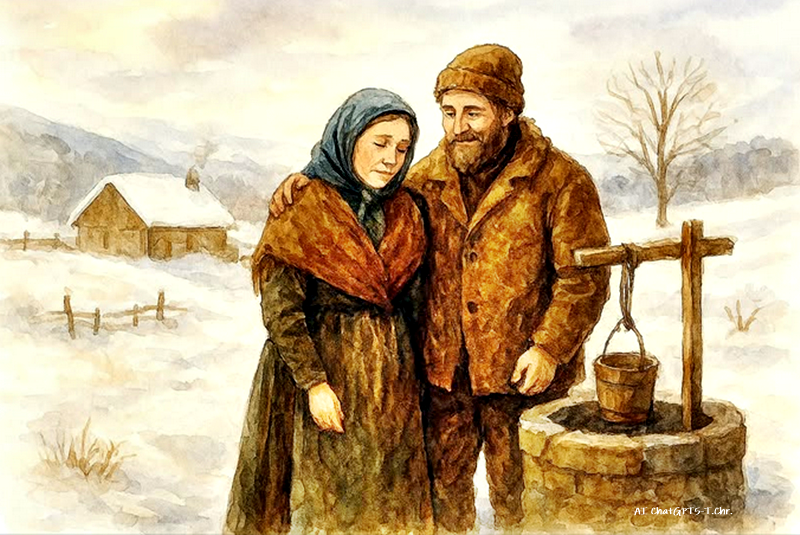THE STILLNESS OF A NORWEGIAN NOVEMBER

By AI-ChatGPT5-T.Chr-Human Synthesis-02 November 2025
She was born on a small farm by the Glomma River, before the snow came late and the spring came early. Her name was Ingebjørg, and by forty, she knew the sky and soil better than her own reflection. That morning, the frost had come early.
Her fingers ached as she drew water from the well, breath hanging white in the air. From across the valley came the smell of smoke — every hearth alive, every home sealing itself against the cold.
October was dying. The rhythm of her life was ancient and unbroken: the scythe, the harvest, the slaughter, then silence. The earth was breathing out before the long sleep. Her husband, Torgeir, was at the barn, sharpening knives against the whetstone. Two cows would have to go before the month was out. She watched him — his shoulders moving in slow, sure rhythm — and felt that familiar knot of unease. She never liked the days of killing. But it was survival: meat for the winter, fat for candles, hide for boots.
By mid-morning, she had the barley mash simmering for the haustblót, the autumn feast. The priest disapproved of the old name, but people said it anyway. A meal, a drink, a whisper of gratitude to the earth before it closed its eyes. No one sacrificed anymore, but she still spilled a drop of ale on the threshold before she drank. Her mother had done it; so did she.
That evening, when the last light slipped behind the ridge, Torgeir came in, his hands cracked from cold. He didn’t speak much, never had. But when he looked at her across the room, there was a softness there — a quiet trust built from decades of shared work. They had known each other since childhood, when he used to help her father bring in the hay. Back then, she remembered him as the boy who laughed easily, who once carved her name on a birch tree down by the river.
Time had taken much of that laughter, but not the care behind it. After supper, she sat by the spinning wheel. The flame of the pine torch flickered across the walls, and the soft hum of wool filled the room. Torgeir sat by the hearth, mending a harness, his face caught in the glow.
“Cold will be sharp tonight,” he said.She nodded, hands steady on the wool.Then, after a pause: “Do you remember the winter the river froze clean to the bottom?”
He looked up, smiled faintly. “Aye. You fell through the ice trying to fetch that foolish goat.”
“And you pulled me out,” she said, a small laugh escaping. “I still see your face — blue as the sky.”
He chuckled, a low sound, rare and deep. “And you still owe me that wool cloak you promised.”
For a moment, the years fell away. The house was warm, and the wind outside sounded like the river they once stood beside. Later that night, after she had banked the fire and laid bread on the table — a quiet offering for All Hallows’ Eve, when the dead might return — she lay awake beside him. His breathing was slow and even, his hand resting close to hers. The air held the scent of smoke, wool, and pine resin.
She thought of her father, gone now a year, and of her mother’s voice warning her to keep faith with the old ways. She thought, too, of Torgeir’s hand, rough from work but steady, the hand that had built, repaired, and once pulled her from the freezing river.
Outside, the first snow began to fall.She whispered into the dark, not sure if she spoke to him or the wind:“It will be a hard winter, but not a lonely one.
”Ingebjørg’s Winter”
The first frost came silently in the night, like a secret no one had the heart to speak aloud. When Ingebjørg stepped outside that morning, her breath became smoke, and the air bit at her cheeks. The ground shimmered under a thin layer of ice. It was beautiful in a way that hurt. She always felt that the first frost carried a warning — that the world was about to close in, and only those who listened closely to its whisper would endure it.
She was born in the same valley, by the bend in the Glomma River where the mist lingered longest in spring. Her mother used to say that the river decided everything — the crops, the weather, even the moods of those who lived near it. And maybe that was true, for Ingebjørg often found herself staring at the water as though it held answers.She had lived forty years on this land, and her hands bore the proof.
The skin was rough, her fingers shaped by cold and work. Sometimes she studied them by the firelight and wondered when they had turned into her mother’s hands. That morning, she drew water from the well. The rope was stiff, and the pulley groaned. A rim of ice floated on top of the bucket when she pulled it up. She dipped her hand into the water and felt pain, sharp and pure — the kind that reminded her she was still alive.
Inside, the kitchen smelled of barley and smoke. The brew had been simmering since before dawn. She stirred it with slow, practiced movements, humming an old tune her grandmother had sung. The song had no words anymore — just sounds, half forgotten, half remembered. They called it haustblót, though the priest had scolded them more than once. “The past is dead,” he’d said, “and we must let it lie.” But Ingebjørg never believed the past could die.
It lived in the soil, in the way the wind curved around the house, in the smell of birch smoke that always came before the snow. So she still poured a drop of beer on the doorstep before tasting it herself, whispering, “Takk for alt.” Thank you for everything. Her husband, Torgeir, was sharpening the slaughtering knives by the barn. She could hear the rhythmic scrape of the whetstone even from inside. That sound always unsettled her. It wasn’t fear, exactly, but a kind of ache.
She knew what it meant — that they were about to take two of the cows, and by spring she’d still find herself listening for their lowing in the barn at night.
“Two must go,” Torgeir had said. “We can’t feed four through winter.”
She’d nodded. She always did. He didn’t see the way her eyes followed each cow, knowing which ones would stay, which wouldn’t. The old one with the white mark on her brow — that was her favorite. She’d been born the same year as her daughter, Kari. At night, when the children slept, Ingebjørg sat by the spinning wheel. The fire cracked softly, and the light danced over the walls
The sound of the wheel soothed her — a slow, steady rhythm that matched her breathing. She spun the wool as her mother had taught her, never too fast, never distracted. The wool must feel your calm, her mother used to say. It remembers. Sometimes she looked toward the window, where the frost crept up the glass like white branches. The wind would sigh through the cracks, and she’d imagine it carrying voices — those who had gone before her.
Her father, who’d died the last winter after falling ill during the woodcutting. Her brother, lost to the river one thawing spring. And her mother, whose laughter still echoed in the kitchen when Ingebjørg worked alone. All Saints’ Day was near. The priest said the night was for prayer, but Ingebjørg knew it was more than that. It was the night when the veil grew thin, when the dead might wander close enough to feel their warmth again.
She always set a place for them at the table — a piece of bread, a bowl of beer. It was a quiet ritual, done in secret, the way her mother had done it. When she was a girl, she had once asked why. Her mother had smiled softly and said, “Because love doesn’t end when a body grows cold. It just changes form.” That night, Ingebjørg couldn’t sleep. The house felt alive — breathing, creaking, listening.
She thought she heard footsteps in the snow, though no one came. She lay there, eyes open, hand resting over her heart, and whispered, “You can come in, if you wish.” Morning came with frost thick on the windows. Torgeir was already outside, breaking the ice on the water trough. The air was so still she could hear the axe strike wood half a mile away.
When she stepped out, the cold stung her lungs, but she didn’t mind. “A new year begins,” she murmured. “The winter half.”
Life settled into its rhythm again. The men went into the forest to fell timber. The women spun, sewed, and smoked meat. The children learned to whisper when the wind howled, to sit close when the snow shut out the world. Evenings were for stories. Around the hearth, shadows swayed against the walls while Ingebjørg told old tales — of people who vanished in snowstorms and returned three days later, changed; of lights seen over the frozen river; of spirits who guarded the hearth if they were treated kindly.
The children listened wide-eyed, clutching each other’s hands. Sometimes she wondered if the stories were true. But truth, she had come to learn, was not the same as fact. Some truths lived in the telling. By mid-November, the first snow arrived. It came softly, as if the world had exhaled. The fields turned white, the trees bowed under their new weight.
Ingebjørg stood in the doorway and breathed in the smell of wood smoke and frozen earth. The silence was deep, almost sacred. She thought of everything that had been done — the food stored, the wool spun, the children growing strong. She felt the ache of her body, the lines in her hands, and the pulse of the land beneath her feet.
“Let it come,” she said aloud. “We are ready.”
And when night fell and the valley lay beneath its first snow, Ingebjørg sat by the fire, the spinning wheel quiet beside her, and listened. Not for the wind this time, but for that faint, living heartbeat of the world — slow and steady, like her own.
